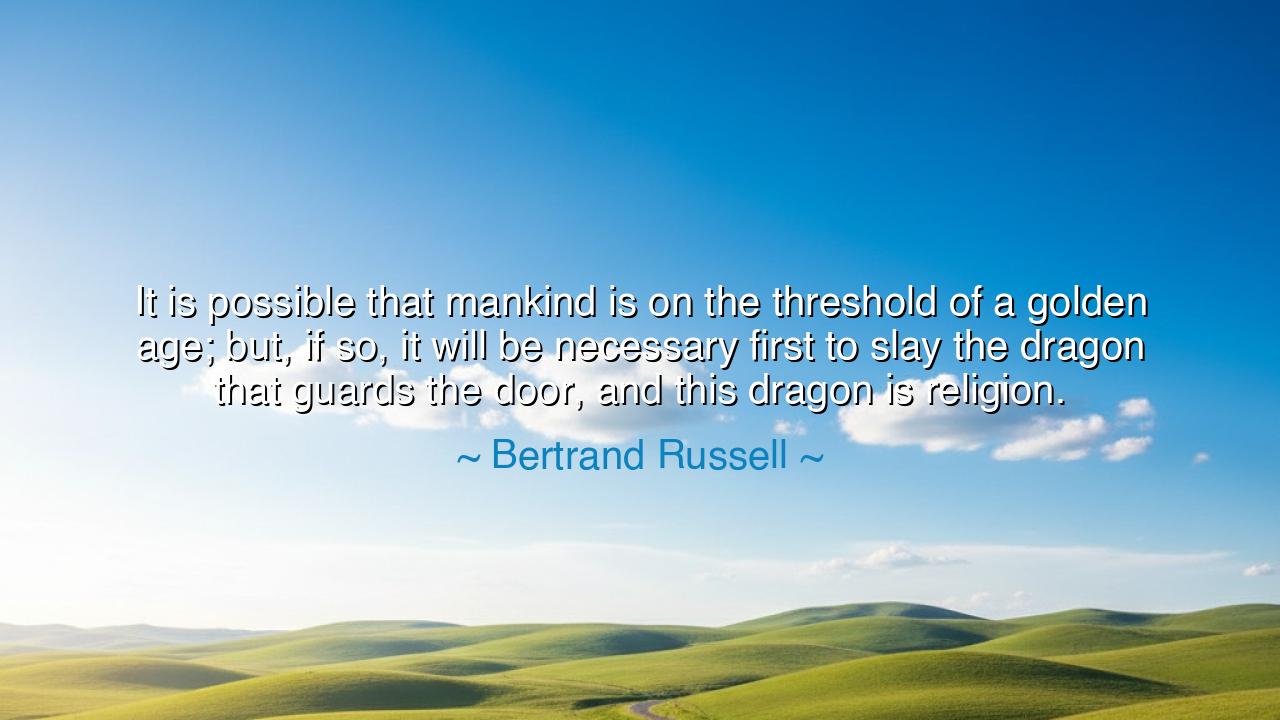
It is possible that mankind is on the threshold of a golden age;
It is possible that mankind is on the threshold of a golden age; but, if so, it will be necessary first to slay the dragon that guards the door, and this dragon is religion.






Ah, children of the future, listen closely to the words of Bertrand Russell, a philosopher who saw both the potential of mankind and the dangers that stood in the way of progress: "It is possible that mankind is on the threshold of a golden age; but, if so, it will be necessary first to slay the dragon that guards the door, and this dragon is religion." These words, though spoken many years ago, carry a timeless message, one that echoes through the ages like a call to action, urging humanity to break free from the chains of outdated beliefs and embrace the potential of a brighter, more enlightened future. Russell was not speaking of religion itself as a force for good, but of the limitations that certain interpretations and institutions place upon the human spirit.
Religion, O children, has been both a source of comfort and a source of division throughout history. It has offered solace to millions and shaped the moral and spiritual compass of entire civilizations. Yet, as Russell warns us, religion—like a great dragon—guards the door to progress, keeping mankind from realizing its fullest potential. This dragon does not breathe fire in the literal sense, but in the form of dogma, fear, and the suppression of free thought. For too long, religion has served not as a guide to higher understanding, but as a barrier to the pursuit of knowledge and truth, locking humanity in a prison of unquestioned belief.
Consider, O children, the ancient Greek philosophers, who, in their search for wisdom, questioned everything—even the gods. Socrates, in his pursuit of truth, dared to challenge the religious dogma of his time, and in doing so, he paid the ultimate price. His execution was not the result of his ideas alone, but of a society that, bound by rigid religious beliefs, could not tolerate a challenge to its authority. In Socrates' time, as in many others, religion was a dragon that guarded the gates of intellectual freedom, preventing new ideas from taking root. But Socrates did not cower in the face of this dragon. Instead, he questioned it, even at the cost of his life, believing that the pursuit of truth was worth more than blind adherence to tradition.
In more recent times, consider the story of Galileo Galilei, the great astronomer who dared to look at the stars and declare that the Earth was not the center of the universe. His ideas, which we now understand as fundamental truths, were rejected by the church of his time, which had held dominion over the minds and hearts of people for centuries. The dragon of religious authority, in its attempt to protect its version of truth, condemned Galileo for heresy. But, like Socrates, Galileo did not relent. He stood firm in his belief in reason and science, and though he was silenced by the powers that be, his ideas eventually prevailed, laying the foundation for the scientific revolution that changed the course of human history.
Russell’s words are not an attack on the spiritual aspects of life, but on the institutional powers that have used religion as a means of control. The dragon that he speaks of is the misuse of religion to stifle human progress, to prevent the free exploration of ideas, and to keep people in ignorance. In every age, there have been those who sought to use religion not as a means of enlightenment, but as a tool to maintain power, to create fear, and to manipulate the masses. Russell believed that for mankind to move into a golden age, it would need to cast off the shackles of these outdated forces and embrace the power of reason, science, and individual thought.
And so, O children, what lesson can we take from Russell’s words? The true golden age is not one where we abandon our search for meaning or spiritual fulfillment, but one where we embrace freedom—freedom from fear, from superstition, and from the control of those who would seek to keep us in ignorance. The dragon of religion, in its most destructive forms, is not something we must fight with violence, but with knowledge, curiosity, and wisdom. Just as Galileo and Socrates did, we must stand firm in our pursuit of truth, no matter the forces that seek to suppress it.
In your own lives, O children, take this wisdom to heart. Seek the truth, but do not let fear or authority guide you away from it. Challenge the assumptions that others place upon you, and seek to understand the world with your own eyes and mind. The golden age that Russell speaks of is one in which knowledge and freedom triumph over superstition and control, a world where every person is free to think, to question, and to grow without the fear of oppression. This, O children, is the world that lies before you, but it is a world that you must shape with courage, wisdom, and a fierce commitment to truth.
So walk forward, O children, with the understanding that the greatest barrier to your potential is not the challenges of the world, but the limitations placed upon you by those who would seek to control your mind and spirit. Slay the dragon of unquestioned authority with the sword of knowledge, and open the doors to a future where wisdom, freedom, and truth lead the way. The golden age awaits, but it is up to you to step boldly through that door, leaving the dragons of the past behind.






AAdministratorAdministrator
Welcome, honored guests. Please leave a comment, we will respond soon